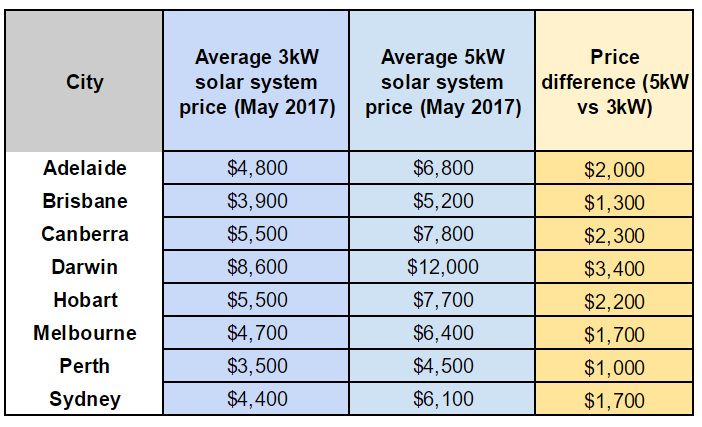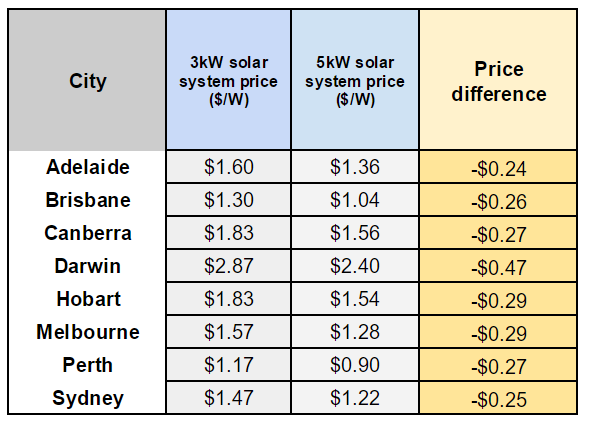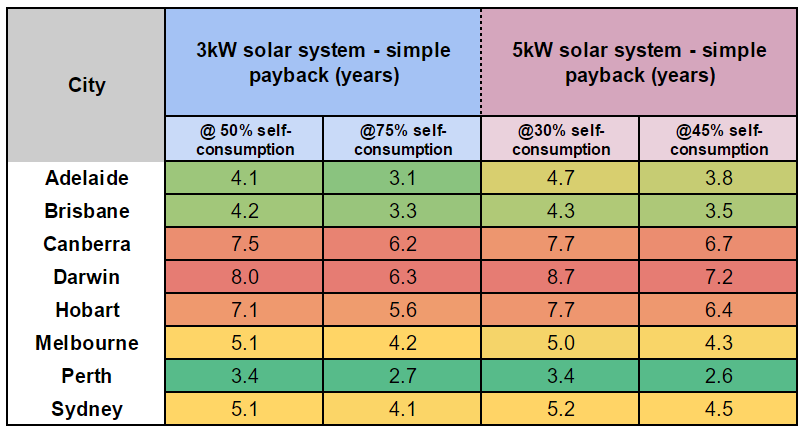One of the first decisions a household considering solar will need to make is the capacity (in kilowatts, kW) of the system to be installed. Two of the most popular residential solar PV system sizes in Australia are 3kW and 5kW. Which system size is the better investment – and why?
Solar self-consumption is still the best way to save
These days, getting the most out of a solar PV system means using the energy directly in your home – ‘solar self-consumption‘. By putting the solar energy go good use within your home, you avoid the need to purchase electricity from the grid – at a rate between 18-35c per kilowatt-hour (kWh), depending on where you are (as per the table below). By contrast, exporting solar energy into the grid will earn you only about 6-8c/kWh.
| Electricity price snapshot by capital city (Feb 2017) | ||
| City | Electricity consumption charge ($/kWh incl GST)* | Solar feed-in rate range ($/kWh)** |
| Adelaide | $0.34 | $0.07 – $0.12 |
| Brisbane | $0.26 | $0.06 – $0.11 |
| Canberra | $0.18 | $0.065 – $0.075 |
| Darwin | $0.26 | $0.08 (estimated) |
| Hobart | $0.26 | $0.067 |
| Melbourne | $0.26 | $0.11 (from July 2017) |
| Perth | $0.27 | $0.08 (estimated) |
| Sydney | $0.24 | $0.10 (estimated, from July 2017) |
*Based on data from EnergyMadeEasy.gov.au and other relevant websites.
**Refer to our article ‘Which retailer is offering the best solar feed-in tariff?’
Conventional wisdom: Smaller systems are better for maximising self-consumption (and savings)
It therefore follows that a smaller system will generally offer better value and returns than a larger one. In fact, this is the advice that Solar Choice and most reputable installers have been giving their customers since the last of Australia’s state-sponsored solar feed-in tariff programs closed a few years ago. The reasoning behind this is that it doesn’t make sense to pay more for a system whose energy you can’t make greater use of.
3kW solar system self-consumption example: Less solar into the grid
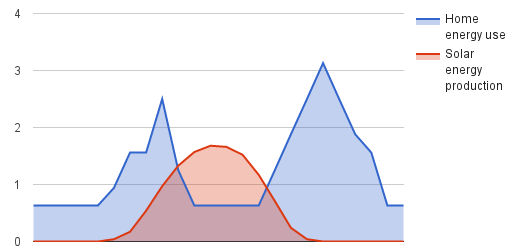
An example of energy production from a 3kW solar system vs home energy consumption over the course of the day. The overlapping red/blue sections denote solar-self consumption, while the red only section denotes solar export. In this case, only a small amount of solar energy is exported.
5kW solar system self-consumption example: More solar into the grid
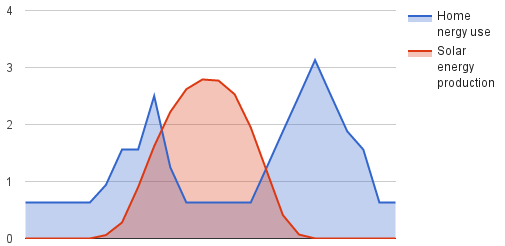 An example of energy production from a 5kW solar system vs home energy consumption over the course of the day. The overlapping red/blue sections denote solar-self consumption, while the red only section denotes solar export. While self-consumption is a bit greater than with the 3kW system in the example above, so is the amount of solar ‘wasted’ into the grid.
An example of energy production from a 5kW solar system vs home energy consumption over the course of the day. The overlapping red/blue sections denote solar-self consumption, while the red only section denotes solar export. While self-consumption is a bit greater than with the 3kW system in the example above, so is the amount of solar ‘wasted’ into the grid.
Smaller systems have smaller price tags…
One of the reasons that a 3kW solar system may is more attractive than a 5kW system is that the price will almost inevitably be lower for the 3kW system. The table below shows the approximate difference between average prices for 3kW and 5kW solar systems in Australian capital cities. On average, a 5kW system costs about $2,000 more than a 3kW system.
But larger solar PV systems offer better value
Even though 5kW systems have higher out-of-pocket costs, they also produce more energy. Often, the increase in price is disproportionately small compared to the increase in energy yields – which means greater value for money. On a dollars-per-watt ($/W) basis, 5kW solar systems are cheaper than 3kW systems across the board – by about 28c/W (as per the table below).
Surprise! Payback on a 5kW system are almost the same as a 3kW system
So let’s assume that you’re tossing up between a 3kW and a 5kW solar system. As per the table below, it turns out that the payback periods for both are often the same or similar – even taking into account the fact that you’ll probably use a smaller proportion of the energy produced by the 5kW system. This helps to explain why 5kW has come to be the average system size for Australia.
Note that we’ve taken a conservative approach and assumed that you’ll use exactly the same kWh of energy in both the low and high self-consumption scenarios. In reality, you’d probably end up with a slightly higher self-consumption ratio than detailed below for the 5kW system because it will produce a bit more energy when you’re likely to use it.
Results generated using Solar Choice’s Simple Solar PV System Payback Estimator, based on average system prices and going electricity rates for each city. Assumes the home uses 25kWh of energy per day averaged across the course of a year.
Why opt for the larger system?
At this point we’ve established that 3kW and 5kW solar systems can theoretically be equal in terms of their investment-worthiness, even though the larger system comes at a higher capital cost. The benefit of going with the smaller 3kW system would be conservation of your savings. What are the benefits of going with the larger 5kW system?
- Slightly more solar energy available when it’s needed most – Most households use the greatest amount of energy around breakfast and dinnertime. A larger system will generate more energy during these time periods.
- Room for future energy growth or changes – Having a larger system leaves you with a lot of wiggle room when it comes to the way you use energy. For example, if you plan on having children or on starting up a home office, you will almost certainly be able to start soaking up the excess sun power at some point in the future.
- More energy available for batteries – If you’ve decided that you can’t yet afford battery storage for your home but haven’t ruled it out for the future, then having a larger system will help ensure that you’ve got enough surplus energy to send into your batteries once they’re installed. (Check out our Solar & Battery Storage Sizing & Payback Estimator Tool.)
All of these details in one chart:
Click to enlarge.
© 2017 Solar Choice Pty Ltd
